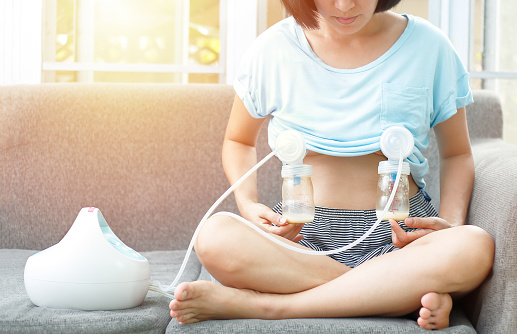Breastfeeding is a choice to be made by every mother. It is always recommended to provide breastmilk to the baby over formula.
Breastmilk has natural antioxidants, antibodies, perfect mix of vitamins, minerals, protein and fat. Antibodies provide immunity to the little one to fight off viruses and bacteria. World health organization recommends exclusive breast milk until 6 months of baby age.
After seeing a pandemic like COVID 19, it reminds us that it is even more important to build strong immunity for your little one.
Breast milk is only low in vitamin D, so most doctors recommend babies a vitamin D drops or supplement or suggest to expose baby for adequate amount of sunlight.
Breastmilk is great for both baby and the mom. According to American Association of Pediatrics (AAP), mother also has significant benefits by breastfeeding. According to this advocacy, mother benefit by lowering their risk of breast and ovarian cancers. Uterus shrinks faster in breastfeeding moms due to the hormone oxytocin. Oxytocin is produced during breastfeeding.
In addition to this, breastfeeding helps in decrease in postpartum bleeding and helps in reducing the postpartum pregnancy weight rapidly. This is because breastfeeding burns about 500 – 600 calories a day but a lot depends on your diet and lifestyle.
Considering the advantages of breast milk over formula, many moms opt for pumping or breastfeeding depending on their situation. Pumping and breastfeeding each have their own significant pros and cons. It is quite confusing to which one to choose.
You can choose either one based on your personal circumstances and the choice you are most comfortable with. Here are some of the reasons to consider for both the options.
Breastfeeding:
- No hassle of pumping and cleaning the parts: If your little one can be fed directly from you, there will be no extra work of sitting aside for 20-30 mins for pumping and then cleaning the parts for another 10 minutes. When your baby is hungry you have to again spend some time in feeding the baby with breastmilk from bottle.
- Depending on how quick you little one takes milk, most babies tend to finish bottle in about 20 – 30 minutes. If you are sticking a recommended frequency of pumping, which is 6 – 8 times depending on which month your baby is. With pumping, it is a total of 8 – 10 hours of time and effort altogether. This is one of the major advantages of breastfeeding.
- Bonding: Skin to skin contact is very beneficial to the baby. Baby feels safe, stable, happier and closer to the mom. Benefits of skin to skin contact might have on baby even for years. You and your little one will have more bonding and in depth communication.
- Ease of feeding: No preparation is needed for feeding your baby! You don’t need to run for a bottle and warmer in middle of the night. It is always served at right temperature and you will have an ease to feed anytime and anywhere!
- Natural Increase in Breast Milk: Breast milk supply is based on a simple formula – demand and supply. The more you feed, the more your body produces milk. Also, baby’s saliva activates the milk producing hormones in moms naturally. This stimulates the increase of breast milk production.
Pumping:
- Latching issues: Many new moms are stressed about the latching. When a good latch is not developed within the very first few weeks, your baby may not take all the milk needed and ask for milk for every 1 –2 hours. If the breasts are not completely empty after feeding every time, overall milk supply is affected. Pumping is a great help to moms who are facing issue with the latching but want to provide breastmilk to baby.
- Returning to work soon or can’t stay around baby: In the event of returning to work soon after the delivery, you might feel stressful about dropping in the milk supply. Pumping helps maintain your milk supply even if you return to the office. Most work places provide a separate lactation room for pumping. You can check with employer to provide with the room. Many employers are very supportive in these issues. You can continue to provide breast milk to your baby.
- Other underlying medical conditions: If you feel like taking more rest after delivery due to stress from giving birth or any other medical condition and would not like to lose milk supply, pumping is a great option. External hemorrhoids during the natural birth or c-section pains might be culprit. Choose to pump while you recover, this will help in not giving up on the breast milk entirely.
- Can keep track of amount of milk intake: Babies have regular weight milestones that needs to be reached. Babies need to be on track with weight. If your baby is not gaining enough weight, it might be due to low milk intake through breastfeeding. It is also very confusing for the first time breastfeeding moms, if the baby is actual eating properly. You can avoid this stress, by opting for pumping. You can always measure and give the baby good amount of milk.
- Oversupply of milk can benefit baby: If you are exclusively pumping and if you produce more than what your baby eats. The extra milk can be safely stored in breast milk bags in freezer. Label the breast milk bags with date and month. Frozen breast milk are good for 4 months. If you originally planned to breast feed for 6 months, your extra storage will help the little one feed on breast milk over 6 months.
Pumping or breastfeeding is a personal choice had to be made considering your circumstances and availability. You can always do mix and match to get the advantages from both pumping and breastfeeding. Depending on the situation, you can either pump or feed directly and still do both of them. Do not stress out and choose what works best for you and your little one!
Did you choose exclusive pumping or exclusive breastfeeding or both? Let me know in the comments 🙂



